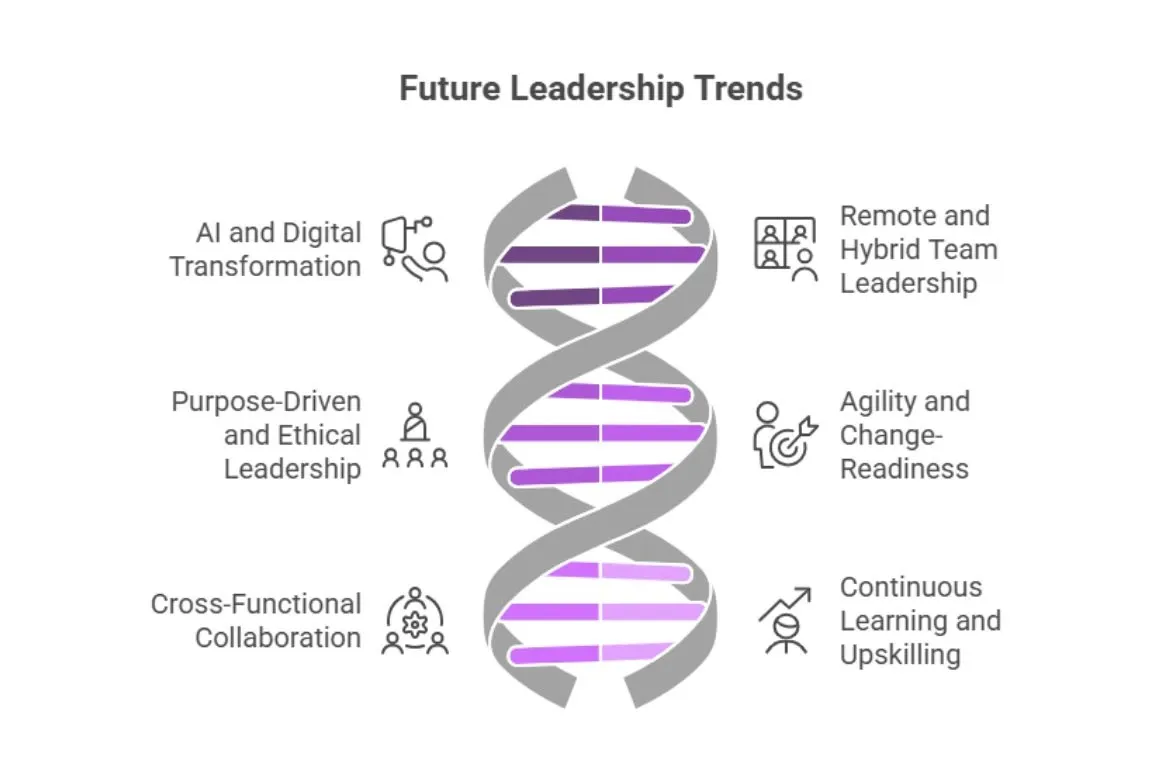What are the ongoing trends, and how do they impact the future of leadership?

Leadership is undergoing a quiet revolution. The traditional top-down model, once defined by control, authority, and long-term certainty, is giving way to a more agile, empathetic, and tech-savvy approach. As we navigate a world shaped by rapid digital transformation, hybrid work models, and shifting workforce expectations, leaders are being challenged to evolve or risk becoming obsolete. It’s no longer just about driving results, and it’s about fostering trust, embracing change, and leading with purpose.
In this blog, we explore the key trends reshaping leadership and what it takes to thrive in this dynamic new era.
Understanding Leadership
Leadership is one of the most complex challenges in today's professional world. Organizations face unprecedented challenges in technology adoption, remote work integration, and global market volatility, which have expanded their definition and scope.
What is leadership in today's context?
Leadership in 2025 goes way beyond traditional command-and-control structures. It represents knowing how to influence, inspire, and guide others toward achieving common goals. Modern leadership approaches connect employees to purpose and accomplishment rather than merely directing their work. In fact, people see effective leaders as visionaries and strategists who provide clarity of purpose, whilst managers monitor performance and maintain organizational stability.
Why leadership is evolving faster than ever?
Several converging factors have accelerated leadership's progress. The leadership landscape is transforming at unprecedented speed, with more than 60% of future jobs not yet invented. Today's graduates are expected to have over 20 different jobs across seven careers.
Technology disruptions have fundamentally altered how teams communicate, cooperate, and make decisions. The workplace expectations have changed dramatically, with employees now viewing cooperation as an expected leadership behavior.
In addition, the pandemic accelerated existing trends. Workplace burnout worsened, which brought employee wellbeing to the forefront of leadership priorities. This sparked a change from management-style leadership to what some call "service leadership", an approach focused on how leaders can make their teams' lives easier physically, cognitively, and emotionally.
Who is a Leader?
A leader motivates and guides others toward a shared goal or vision. They take responsibility, make decisions, support their team, and help people grow and succeed, whether in a workplace, community, classroom, or other group setting.
Key traits of modern leaders
Today's leaders show specific qualities that help them inspire and direct their teams well. Integrity tops the list as 75% of employees' most valued leadership trait, while 67% believe high moral standards make the most significant leadership quality. Transparency builds trust, letting leaders create spaces where new ideas and inventions can grow.
Vision gives teams direction and purpose, bringing them together for shared goals. Leaders who express their vision clearly create workplaces where innovation thrives. Research also shows that empathy is the top leadership skill.
Leaders need other vital qualities too. They should adapt to quick changes, bounce back from failures, and stay tech-savvy to use technology well. A leader's self-awareness helps them understand their strengths and limits, which leads to genuine leadership styles and personal growth.
What Do You Mean by Leadership Development Trends?
The business world moves at an extraordinary pace, which compels organizations to reconsider their leadership development approach. Today's volatile environment demands evolving methodologies that organizations use to prepare future-ready leaders.
Definition and importance
Leadership development patterns show how organizations identify, grow, and strengthen their current and future leaders. Leadership development has become more critical than ever. These patterns demonstrate changing business priorities and new challenges that require enhanced leadership capabilities.
Modern organizations acknowledge that leadership development extends beyond C-suite candidates. Employees at every level now make important decisions that must match corporate strategy and culture. This development has evolved from a basic training exercise into an essential investment.
From digital disruption to generational shifts, key trends are redefining the skills and mindset leaders need to succeed.
Trends Shaping the Future of Leadership

Six major trends are changing what organizations need from their leaders today. Leaders must develop new skills and ways of thinking to succeed in the coming years.
1. AI and digital transformation
AI is changing how leadership works at its core. Research shows that employees trust AI more than their human bosses in some leadership areas. Leaders need to build skills that machines can't copy, especially human qualities like empathy and ethical decision-making.
Digital transformation requires leaders who can match technology with human needs. Most of the businesses use AI now, while the remaining are planning to implement it. Leaders must know how to use AI in decisions while tackling issues like data privacy, bias, and transparency.
2. Remote and hybrid team leadership
Hybrid work has become the norm, with 87% of U.S. workers choosing to work remotely when they can. This brings new leadership challenges, such as proximity bias, where we naturally favor people we see in person.
Leading hybrid teams well means building connections across physical distances. Leaders need clear communication rules, proper work-life limits, and ways to help teams bond virtually. Managing hybrid teams requires a good mix of flexibility and structure to keep teams united, no matter where they work.
3. Purpose-driven and ethical leadership
Ethics in leadership build on respect, accountability, and community to create lasting success. This makes workplaces where transparency and inclusion matter, and everyone feels safe speaking up.
Modern leadership looks beyond profits to see how decisions affect everyone involved. Gen Z will make up 25% of workers by 2025, and they want stronger ethics from leaders than previous generations did. Companies need clear ethical guidelines, good examples from the top, and ways to report concerns.
4. Agility and change-readiness
Leaders must foster adaptability in their organizations. Being ready for change now means staying adaptable all the time.
Leaders who handle change well show four key traits:
- They face tough feedback head-on
- They want to understand others' worries and views
- They adapt quickly when plans go wrong
- They keep going despite challenges
5. Cross-functional collaboration
Leaders who work across departments break down old barriers and help new ideas flow. Good cross-functional leaders excel at organizing, planning, and working with people. They guide teams through issues like resource sharing, complex communication, and who's responsible for what. When done right, this teamwork creates innovation by mixing different points of view on tough problems.
6. Continuous learning and upskilling
In today’s rapidly evolving world, the qualities that defined successful leadership a decade ago are no longer sufficient. Emerging trends, such as digital transformation, AI integration, remote and hybrid work models, and the growing emphasis on diversity and sustainability, are fundamentally reshaping what it means to lead.
Nowhere is this shift more visible than in India, where economic growth, a booming tech sector, and a youthful, digitally connected workforce are accelerating the pace of change.
Conclusion
Technology advancements, changing workplace expectations, and evolving employee values have dramatically changed leadership over the last several years. Tomorrow's successful leaders need to balance technical expertise with human-centered capabilities that machines can't replicate. Adaptability stands out as the key trait, and leaders must accept change instead of resisting it.
Six trends we discussed in this piece - AI integration, hybrid team management, purpose-driven leadership, organizational agility, cross-functional collaboration, and continuous learning - will speed up as we approach 2030. Organizations that build these competencies now will gain major competitive edges.
Every organizational level needs leadership capabilities, especially as decision-making becomes more distributed. Organizations that spread leadership development across all levels build stronger, more innovative, and adaptable cultures. Digital business leadership can provide the essential skills and knowledge to leverage your abilities to grow as a professional in this field.
Future leaders need both technical competence and emotional intelligence. They must understand AI applications while building human connections that technology can't replace. This combination of skills will determine leadership success in the coming years. AI for leaders can prove beneficial in getting hands-on experience with AI applications and tools.
As we know, Leadership excellence is an ongoing process. So, New challenges will arise and trends will shift, but integrity, vision, and purpose will remain constant. Leaders who combine these core qualities with the ability to direct change create the foundation for success in 2025 and beyond.
Frequently Asked Questions
Q1. What are some of the trends that will affect the future of leadership?
Five key questions are changing what we need from leaders. Leaders must think about where they'll find skills for upcoming changes, especially in sustainability and digital transformation. They need to keep up with new problems, any push to prepare organizations for the future starts at the top.
Q2. What is the future of leadership in 2030?
Leadership in 2030 will blend tech smarts with stronger human bonds. Smart leaders will balance AI-powered decisions while tackling worries about data privacy, bias, and openness. Leaders in 2030 will also focus more on purpose, since Gen Z (making up 25% of workers by 2025) wants stronger ethical leadership than older generations.
Q3. What are the 5 C's of leadership development?
The 5 C's include everything needed to grow great leaders: Communication, Collaboration, Critical thinking, Creativity, and Character. Self-awareness and understanding of people are the lifeblood of lasting leadership success.
Q4. What is the emerging new approach to leadership?
Modern leaders focus on building workplaces where openness and inclusion thrive and where everyone feels safe speaking up. Leadership development now reaches all company levels instead of just the executive suite.

TalentSprint
TalentSprint is a leading deep-tech education company. It partners with esteemed academic institutions and global corporations to offer advanced learning programs in deep-tech, management, and emerging technologies. Known for its high-impact programs co-created with think tanks and experts, TalentSprint blends academic expertise with practical industry experience.



